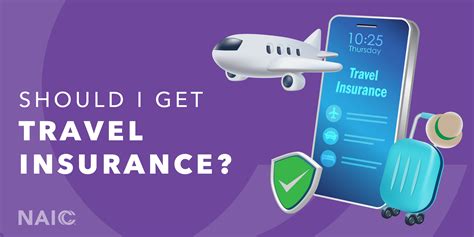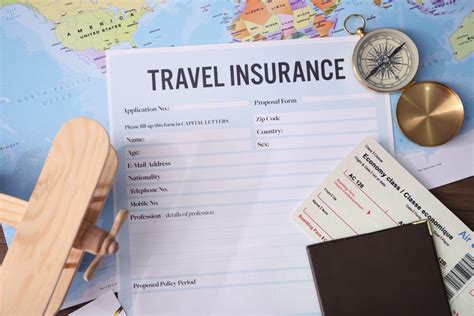Should I Get Travel Insurance

Travel insurance is an essential consideration for any traveler embarking on a journey, whether it's a quick weekend getaway or an extended international trip. While it may seem like an added expense, travel insurance can provide valuable protection and peace of mind during your adventures. In this comprehensive guide, we will delve into the world of travel insurance, exploring its benefits, types, and how it can safeguard your travels. So, let's discover why travel insurance should be at the top of your packing list!
The Importance of Travel Insurance

Travel insurance acts as a safety net, offering coverage for a range of unforeseen events that could potentially derail your trip. From medical emergencies and trip cancellations to lost luggage and travel delays, travel insurance policies are designed to mitigate the financial impact of these unexpected occurrences.
Consider this scenario: you've planned an exciting hiking trip to the mountains, but just before your departure, a family emergency arises, forcing you to cancel your plans. Without travel insurance, you might be left with little to no refund for your non-refundable reservations. With travel insurance, however, you could potentially recover a significant portion of your costs, providing financial relief during a stressful time.
Understanding the Coverage Options

Travel insurance policies come in various forms, each offering different levels of coverage tailored to your specific needs. Here’s a breakdown of some common types of travel insurance:
Medical and Health Insurance
Medical travel insurance is a vital component, especially when traveling abroad. It provides coverage for emergency medical treatments, hospital stays, and even evacuation expenses if necessary. In some countries, healthcare costs can be exorbitant, so having medical travel insurance can prevent financial strain during a medical crisis.
Trip Cancellation and Interruption Insurance
This type of insurance protects you in the event of unforeseen circumstances that lead to trip cancellation or interruption. It can reimburse you for non-refundable expenses such as flight tickets, accommodations, and tour packages. Trip cancellation insurance often covers situations like severe weather events, natural disasters, or personal emergencies that arise before your departure.
Baggage and Personal Effects Insurance
Traveling with valuable items or delicate equipment? Baggage insurance can provide coverage for lost, stolen, or damaged luggage and personal belongings. This type of insurance is particularly useful for photographers, videographers, or travelers carrying expensive electronics.
Travel Delay Insurance
Travel delays are an inevitable part of any journey. Travel delay insurance covers unexpected delays caused by weather, mechanical issues, or other covered reasons. It often provides reimbursement for additional expenses incurred during the delay, such as meals, accommodation, or alternative transportation costs.
Emergency Assistance and Evacuation Insurance
In the event of a medical or security emergency during your travels, emergency assistance and evacuation insurance can be a lifesaver. This coverage includes medical evacuation to the nearest appropriate medical facility, as well as assistance with arranging transportation and communicating with local authorities.
Factors to Consider When Choosing Travel Insurance
When selecting a travel insurance policy, it’s crucial to consider your specific needs and the potential risks associated with your destination. Here are some key factors to keep in mind:
- Destination: Research the medical facilities and costs in your travel destination. Some countries may have higher healthcare expenses, making medical travel insurance even more crucial.
- Trip Duration: Longer trips often come with a higher risk of unforeseen events. Consider the length of your trip and choose a policy with adequate coverage duration.
- Activities: If you plan to engage in adventurous activities like skiing, hiking, or extreme sports, ensure your policy covers these activities. Some insurance providers offer specific adventure sports coverage.
- Pre-existing Medical Conditions: If you have any pre-existing medical conditions, disclose them to your insurance provider. Many policies offer coverage for pre-existing conditions with certain conditions and exclusions.
- Travel Companions: Consider the age and health of your travel companions. Older travelers or those with specific medical needs may require additional coverage.
How to Get the Best Value for Your Travel Insurance
To ensure you get the most value out of your travel insurance, follow these tips:
- Compare Policies: Research and compare different travel insurance providers to find the best coverage and price. Look for policies that offer the specific coverage you require without unnecessary add-ons.
- Read the Fine Print: Carefully review the policy details, including exclusions and limitations. Understand what is and isn't covered to avoid any surprises.
- Bundle with Other Insurance: Some providers offer discounts when you bundle travel insurance with other policies, such as home or auto insurance.
- Start Early: Purchase your travel insurance as soon as you book your trip. This ensures you're covered for any trip cancellation or interruption that might occur before your departure.
- Consider Annual Policies: If you travel frequently, an annual travel insurance policy can be more cost-effective than purchasing multiple single-trip policies.
Real-Life Scenarios and Success Stories

Travel insurance has proven its worth time and again in real-life situations. Here are a couple of stories highlighting the importance of travel insurance:
Medical Emergency Abroad
Sarah, a solo traveler, was exploring a remote island when she slipped and broke her ankle. Without travel insurance, she would have faced significant medical expenses and the challenge of arranging her own evacuation. Fortunately, her travel insurance covered the medical treatment, evacuation, and even provided assistance with finding suitable accommodation until she could return home.
Trip Cancellation Due to Natural Disaster
John and his family had booked a dream vacation to a tropical paradise. However, just days before their departure, a hurricane hit the region, causing widespread damage and forcing the cancellation of their trip. Thanks to their trip cancellation insurance, they were able to recoup most of their non-refundable expenses, including flight tickets and resort reservations.
The Future of Travel Insurance
As the travel industry evolves, so too does travel insurance. Insurers are increasingly offering more specialized policies to cater to unique travel needs. For instance, some providers now offer coverage for digital nomads, incorporating remote work considerations into their policies.
Additionally, with the rise of sustainable and responsible travel, insurance providers are exploring eco-friendly coverage options. These policies may include carbon offsetting initiatives or support for local communities at travel destinations.
In conclusion, travel insurance is an indispensable tool for any traveler. It provides a safety net against unforeseen circumstances, allowing you to focus on creating memorable experiences. By choosing the right policy and understanding your coverage, you can embark on your travels with confidence and peace of mind.
What is the cost of travel insurance?
+The cost of travel insurance can vary depending on several factors, including the duration of your trip, your destination, and the level of coverage you require. On average, travel insurance policies range from 4% to 10% of your total trip cost. It’s recommended to get quotes from multiple providers to find the best value.
Do I need travel insurance for short trips?
+Even for short trips, travel insurance is highly recommended. While the chances of experiencing a major issue may be lower, unexpected events like medical emergencies or lost luggage can still occur. Travel insurance provides protection and peace of mind for any trip, regardless of its duration.
Can I purchase travel insurance after my trip has started?
+While it’s ideal to purchase travel insurance before your trip, some providers offer coverage that can be purchased mid-trip. However, keep in mind that certain types of coverage, such as trip cancellation, may not be available once your trip has begun. It’s best to secure your travel insurance before departing.



